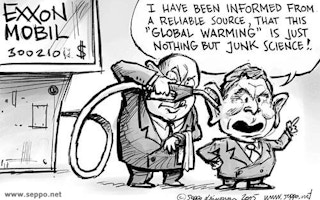The quality and language of climate change denial can be predicted by ties to “elite corporate benefactors”, according to new research.
And that could explain why still only 44 per cent of Americans believe climate change is happening, despite nearly all climate science research pointing in one direction: that greenhouse warming as a consequence of human activity is real.
Justin Farrell, assistant professor of sociology at Yale University in the US, writes in Nature Climate Change that semantic analysis and statistical techniques can identify “organisational power” within the contrarian network that has somehow persuaded US voters that scientists are “divided” on the issue of climate change.
Researchers have already made connections between money from unnamed sources and the contrarian lobby. They have also shown that, either subtly or openly, the denial lobby has influenced the language of discussion about climate issues. And they have confirmed that the denialists are saying things that are at odds with the science.
Ideological polarisation
Dr Farrell has previously shown, in the Proceedings of the National Academy of Sciences, that corporate funding has influenced the ideological polarisation of climate change discussion.
And his latest study − coinciding with yesterday’s opening in Paris of COP21, the UN summit on climate change − may help illuminate the disconnect between scientific concern and apparent political and public inertia. As US president Barack Obama said at the opening: “One of the enemies we will be fighting at this conference is cynicism.”
To establish the political and social processes that seem to drive doubt, denial and contrarian politics, Dr Farrell did more than just sample the so-called climate debate. He examined the lot.
He collected all the written and verbal texts that used the phrases “global warming” and “climate change” delivered between 1993 and 2013 by every contrarian organisation. These added up to 40,785 documents press releases, published papers, website articles, academic research and conference transcripts − totalling 39 million words.
He then looked at what the US media had to say within the same period in 14,913 documents, and also 1,930 documents from three US presidents during the same period, and every mention on the floor of the US Congress − adding up to another 7,786 documents.
“
Climate sceptics and climate deniers are given equal time and treated with equal weight as scientists and scientific facts – even though the scientists who refute global warming are a minuscule number.
Diego Roman, assistant professor of Teaching and Learning at Southern Methodist University
He also obtained data from the US Internal Revenue Service to identify which of the identified contrarian networks had received funding from either US oil giant ExxonMobil or the Koch family charitable foundations − both of which had in the past been linked to challenges to mainstream climate research.
He then used statistical tools to try to establish connections. These involved terms that most people find migraine-inducing − such as least squares regression, singular value composition, and aggregated mean coefficient – to trace similarities between different texts and create a series of “family” connections in the language used.
The study revealed, he writes, “a densely connected region, flanked by more loosely connected individuals and organisation”.
And from this, he found that organisations that received corporate funding from the oil giant or the Koch brothers’ foundations had significantly higher “betweenness centrality scores”. That did not mean that the most influential organisations were also the most generously funded.
Dr Farrell explains: “What matters most for whether or not an organisation is more centrally located within this network has less to do with their financial assets or the amount of donations they receive, but whether or not they had financial ties to corporate benefactors at all, thus signifying entry into a smaller circle of influence.”
He then studied the language of the presidency, congress and the media, and found something significant: that organisations with corporate benefactors were better at getting their message across to the media, and to the public.
The study has, he believes, broader implications for the privatisation of science, the influence of corporate lobbying around scientific issues and, by extension, the increasing concentration of corporate wealth in the US.
Public confusion
In parallel textual research, Diego Roman, assistant professor of Teaching and Learning at Southern Methodist University in Texas, and a colleague have identified a second source of potential public confusion: the US school textbook.
They report in Environmental Education Research that they sampled four textbooks published in 2007 and 2008, and analysed 279 clauses containing 2,770 words discussing climate change. The overall message from the school texts was that climate change was possibly happening, that humans might or might not be causing it, and that it was not clear that mitigating action was needed.
They also report that only 33 per cent of the US public thinks climate change is a serious threat. The textbooks misrepresented actual scientific discourse that sees climate change as an environmental problem of immense risk, where the human impact is clear and immediate action is warranted.
“Climate sceptics and climate deniers are given equal time and treated with equal weight as scientists and scientific facts – even though the scientists who refute global warming are a minuscule number,” Dr Roman says.










